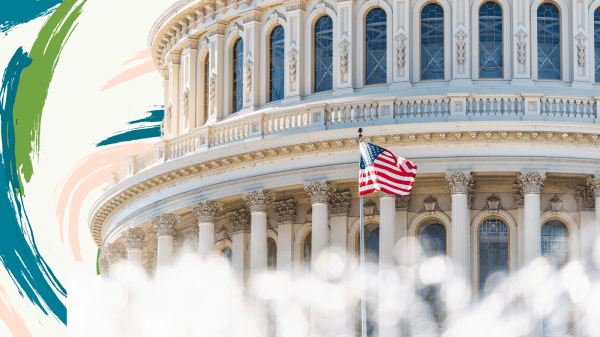Prep Your Advocacy Toolkit

Thank you for joining us on Thursday, March 17 for the EE Advocacy Call hosted by Brock Adler, Chair of the NAAEE Advisory Committee, Jeanine Silversmith, RIEEA Executive Director, and Sarah Bodor, Director of Policy & Affiliate Relations at NAAEE.
Where Are We with 2022 Appropriations
As of the week of March 14, 2022, we have a signed bill that will fund the federal government for the remainder of the fiscal year. We are tracking environmental education funding for EPA and NOAA programs.
Vocab Check! Appropriations are a sum of money devoted to a unique purpose. In the United States federal government, Congress directs how appropriations should be marked.
EPA:
- There was a tiny increase over last year for the EPA Office of Environmental Education: $8.6 million line item.
- Our advocacy success was reflected in a Senate proposal with a $10 million line item.
- We have more work to do in the House to achieve an increase for the fiscal year 2023.
NOAA:
- We’re excited to see NOAA’s Office of Education report an additional $500,000 for the BWET program.
- Environmental Literacy Grants will come from the Office of Education’s base funding. Base funding is $5.5 million for the fiscal year 2022, and the decisions on how to allocate those funds are made internally. NOAA will communicate how funds are allocated.
Moving Ahead: Fiscal Year 2023
Key points:
- We will once again be seeking increases in funding for EPA and NOAA programs.
- For EPA’s Office of Environmental Education, we are reaching for the full authorized amount of $14 million.
- Our House and Senate champions are currently circulating final appropriations requests in the House and Senate.
We are working closely with House and Senate offices to draft appropriate and strategic requests to achieve funding for EPA programs.
How Do We Navigate Our Work in Appropriations
To make budget decisions, appropriations committees listen to colleagues—other representatives and senators—who submit formal requests for specific programs. These formal requests come in the form of “Dear Colleague Letters.” These letters are led by a champion in each chamber, House and Senate. The letters are circulated during the appropriations process to voice specific funding requests and are directed at appropriations subcommittees.
Action Alert: Join NAAEE efforts and call or email your House representatives and Senators to sign on to these support letters.
Our advocacy is behind-the-scenes, working to persuade as many members of the House and Senate as possible to sign on to these letters.
Contacting Your Legislators
1. Reach the right person!
Start with a phone call to the DC office (or email if you already have a relationship). When you make the initial call, verify that you are reaching the right person to talk about signing a support letter. Explain your purpose and get the name and email of the appropriate contact.
Sample script:
“Hi, this is [NAME]. I’m a constituent from [CITY, STATE]. Can I speak to someone who deals with appropriations for environmental education in your office?”
OR
“Hi, this is [NAME]. I’m a constituent from [CITY, STATE]. Who can I speak to about signing an appropriation support letter for environmental education?”
Be aware that responses may vary. The person who answers the phone may try to rush the call. However, remember this is your representative’s office, and the staff is there to respond to your questions and requests. You want to be connected, either by email or voicemail, to the right person who will decide to sign on to the letter or to the person who will elevate that decision to those who can say, “Yes, we will sign on to the letters.”
2. It’s OK to leave a voicemail and follow up by email.
Sample script for leaving a voicemail message:
For your senator: “Hi, my name is [NAME.] I’m a constituent from [CITY, STATE.] I am a member of [ASSOCIATION FOR ENVIRONMENTAL EDUCATION] and I’m calling to ask that [SENATOR’S NAME] sign on to New York Senator Kirsten Gillibrand's Fiscal Year 2023 appropriations support letter to fund environmental education at the EPA for the full authorized amount of $14 million dollars."
OR
For your House representative: “Hi, my name is [NAME.] I’m a constituent from [CITY, STATE.] I am a member of [ASSOCIATION FOR ENVIRONMENTAL EDUCATION] and I’m calling to ask that [REPRESENTATIVE’S NAME] sign on to House Representative Joe Neguse's Fiscal Year 2023 appropriations support letter to fund environmental education at the EPA for the full authorized amount of $14 million dollars.”
After your phone call, the person at the other end of the call will filter through these requests and will sign on or send it to someone who can decide. The best news is that it doesn’t take more than one or two calls for this to happen in a given office. We are advocating a very modest and specific request and representatives are geared up to hear your calls. You are the expert in the field!
“The core of democracy is members of the community saying this is our priority.”
—Brock Adler, Chair of the NAAEE Advocacy Committee and eePRO Group Co-Leader for Advocacy, Policy, and Civic Engagement.
What You Can Do Now
1. Identify your legislators and committee assignments.
Visit your representatives’ websites and learn more about their backgrounds. This is important because if you know that your representative signed on to the support letters a year ago, you can strengthen your call by starting with a thank you for their previous support. It’s kind, and it also helps to remind them!
Tip: Did you know your representatives include both your residence and work? Scale your advocacy impact! Reach out to your Congressmembers and Senators for both where you live and work.
We are prioritizing who we reach out to for the fiscal year 2023 appropriations, and those include previous supporters, appropriations committee members (who may not sign on but are still key,) retiring members, and freshman representatives. There are over 100 representatives and almost 50 senators who have supported environmental education over the past 15 years.
2. Ask your Representative and Senator to sign support letters.
Please read NAAEE's EE Advocacy Guide for suggested talking points and more information about the request.
3. Connect with your state Affiliate.
Do you know your local Affiliate organization? Don’t miss out on additional training and resources. Find your state Affiliate and contact them to find out how you can get involved.
Sign up for the Advocacy, Policy, and Civic Engagement eePRO Group and subscribe to the email list to stay updated on upcoming resources.
Thank you for your continued efforts to advance environmental education!
